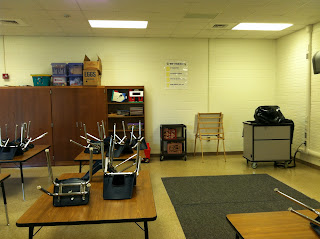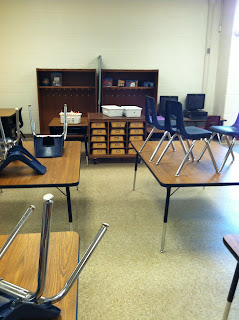I'm linking up with The Lesson Plan Diva to share my classroom and behavior management system. You should head on over there...she has some great stuff:)
Let me begin this post by first stating how incredibly important I think it is to realize that what works for one teacher may or may not work for another. So for any new teacher reading this post, learn to pick and choose. Find what works best for you and make it happen.
Although there have been MANY things during my teaching career that I have been unsure of (ideas, lessons, certain books, parent communication, etc.) my ability to run a smooth and well managed classroom has never been one of them. In fact, I've always taken a little pride in knowing that this is the one thing I do really well. Don't get me wrong, I have some doozy stories about "crazy" kids and I have had many nights where I have gone home and quickly reached for
a tall glass of wine my prayer journal, but those are the kids we will always remember and who have made an everlasting imprint on our hearts!
First I will preface by saying
The First Days of School by Harry Wong was incredibly influential during my first 9 years of teaching. Yes, you read that correctly. I read that book thoroughly from cover to cover before ever teaching my first class, I had sticky notes and highlights through the whole book and then every year before returning to school I would pull it back out and read over all those notes and highlights. Last year was the first year that I did not pull it out because at this point I am pretty sure I have it memorized! I left it laying in the middle of the desk (sticky notes and all) for the teacher who is taking over my room. She will be a first year teacher and I hope it will be as valuable to her as was to me.
I firmly believe that it is much easier to "lighten up" as the year progresses rather than "tighten down." It is important to set a calm, organized, comfortable and welcoming environment from day one. I use a friendly but confident voice that rarely raises to a volume that could be considered "yelling", in fact the only time I ever yell is when I need to be heard over a large crowd. I form a relationship with my students by letting them know who I am. I speak to them as people rather than little kids who have no business knowing about my personal life. They learn to think of me as a friend. I spend time at least once a week during morning meeting (usually Monday) telling them about what is going on the Ziegler house. They hear all about my two kids and my crazy husband. They know them all by names and could tell you at least one funny story about each one. I frequently have past students from YEARS ago come up to me and say "How's Charlie" or "How's Jackson". My family becomes theirs (in a sense). Comrade is an important tool, my kids are respectful towards me because I am their friend and the last thing they want to do is disappoint me.
Okay, so enough about my personal philosphy on this topic. Let's get to the stuff you really want to hear!
Thanks to the inspiration of my AMAZING mentor teacher with whom I did my student teaching, I have used the same system every year in every grade level (1st -3rd) with just a few tweaks each year. I will write about the way it was used in my first grade classroom:
I use a fake money system. It used to be called "Cordell Cash" (my maiden name) but then it turned to "Class Cash". I think this year it will be "Class Coins" because as a K teacher we will deal mostly with pennies. Students earn money for a variety of things but the most common way is by being responsible. They get a penny every morning for showing up and having their daily calendar initialed. If they don't have it, they don't get paid. No big deal. No big fuss. They just don't get paid. I explain to them that I have to be responsible for my job if I want to get paid. If I don't do the work, I won't make the money.
They will earn another penny at the end of every day if they have followed classroom expectations all day. So each student gets 2 pennies every day...unless they didn't get the initial or they didn't make good choices throughout the day. Part of our classroom discussion on the first day of school when we are going over procedures, etc. is how important it is for them to get a parent initial each night. The initial is my way of knowing parents are looking inside the daily communication folder EVERY DAY. I teach my kids that it is THEIR responsibility to have it signed, if they have to "chase their parents around the house with the calendar at night" then so be it. For the
nay-sayers who are reading this and shaking their head and thinking it is completely unfair of me to expect such a thing of six year olds...I have 9 years of documentation to prove that is is possible and it does indeed work. You have to have faith in your kiddos. Your students will almost always rise to your expectations...so make them high:)
They earn additonal money throughout the day for various reasons. They can also LOSE money throughout the day. Students keep track of their behavior with the following behavior "chart":
I tried the trendy idea of moving clips up for good and super behavior one year. It was a complete disaster for me. I would always forget to move clips up so it ended up being an "ambassador" of favoritism. I applaud those who make it work!
The yellow warning is nothing more than just that...a warning. The other two speak for themselves. I can say with complete honesty that it is VERY RARE for a student to ever get to "STOP". Time out of recess means the student would pace for the first 5 or 10 or 15 minutes (depending on the severity of the crime) rather than play. Pacing is wonderful because the student is being active by walking but not getting the free play time that he/she loves the most! I don't' know how it works in other states but in N.C. there is a law that says all students must receive 30 minutes of physical activity on a daily basis. This means no "sit-outs" in N.C.! Students who have their clips on GO at the end of the day get a check in their daily calendar. Students who are on Oops or Stop will get an X with an explanation for their parents to read and initial. This is a copy of my daily behavior calendar (click on the image for a link):

Students have two weeks to save their money. At the end of every other week we have a class auction. This is the BEST part of the plan. Kids love it! I fill a bag with enough items for each student in the classroom plus two or three extras. Items come from donations and or things I bring from home that would have been trashed at some point. Items also come from those gifts you get from people and you have no idea what you would ever use them for....well now you do! They can go in the auction bag. You would be surprised by things that get the kids excited. Picture frames (the cheap paper one from the dollar store that come in a pack of three), shower loofahs, calculators, the fake credit cards we all get in the mail and throw away, and Yoo Hoo's (those fake chocolate milk drinks) are always a HUGE hit with my kids. Class made coupons for things such as "sit at the teacher desk" and "keep a bottle of water at your desk" also make AWESOME auction items and they are completely free. In fact a few of my colleagues who had decided to adopt the same management plan ended up using ONLY class coupons for their auctions and they were apparently a smashing success:) So, you present the items up for auction to your students, one item at a time and then leave them laying in sight of the class. Hold the extra 2 or 3 items in the bag until the very end. After they have seen all their choices you begin by holding up the first item and asking for a bid. The student who is willing to give the most money for that item...wins! Each student gets one item and can no longer bid until every one in the classroom has something. Once every student has an item you can reveal the last 2 or 3 for those who may have money left over. So they learn the concept of saving, they learn that is important to earn their money and not lose it for being irresponsible or for making bad choices (the same lesson we learn fully as adults), they learn about exchanging 5 pennies for one nickel, or 10 for a dime, etc. , It builds coin recognition and money counting skills. The life lessons built into this behavior management system are endless!
The money also works wonders for bribery! For instance: "If you bring your field trip permission form back TOMORROW you will get 3 extra pennies!", "Any child who gets their mom, dad, babysitter, older sister etc, to comment on our class blog, you will earn an extra penny!", "An extra penny for every person in the group who shows the best collaboration and listening skills!" The mere sound of my hand going into the class coin container can make my class completely silent in just a matter of seconds.
TIP: I use a vegetable tray with a lid similar to this one to store my coins...
This is a copy of the paper I send home at the beginning of the year explaining this system and my expectations to the parents. Click on the image for a link to the document. Hope it's helpful to you!
This will be the first time I've tried the fake money in Kindergarten so I am sure I will have to tweak it quite a bit, especially in the beginning. Any thoughts from you?
WOW! This post has a lot of words! Sorry if I said too much, I have that problem sometimes:)



































































































